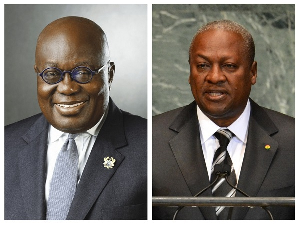Just some few days ago we woke up to the news of ING Bank ordering the Ghanaian embassy in Belgium to withdraw all of its money and subsequent closure of accounts by 12th November 2020.
In response to this, the Parliament of Ghana is sending a delegation to Belgium to probe into this matter.
However, I find this intriguing considering the provisions for International Cooperation in the fight against Money Laundering and Terrorism Financing which may not require travelling especially in this COVID -19 era.
Although it could be said that the Parliament delegation shows the seriousness of government in tackling the issue, I believe the appropriate body to be used is the Financial Intelligence Centre (FIC) of Ghana in collaboration with other investigative bodies like Economic and Organised Crime Unit (EOCO).
The bank refused to give reasons for the order when enquired by the embassy officials and I do not believe the Bank’s position would change with the presence of the said delegation.
Embassy accounts are already classified as high risk which may require Enhanced Due Diligence (EDD) even without the recent EU blacklist. Given that banks similar to ING still hold accounts of Ghana Embassies and banks in general hate to close accounts, it could be inferred that what might have triggered the closure order could be a Suspicious Transaction /red flag too grave that may require filling and potentially filled with the Belgian Financial Intelligence Processing Unit.
That said, FATF recommendations 36-40 talks about international cooperation and makes provision for Mutual Legal Assistance Treaties (MLATs) that could be helpful in obtaining the required information from Belgium regulatory authorities.
More so, the Egmont Group of Financial Intelligence Units which both Ghana and Belgium Financial Intelligent Centres belong to had adopted the Principles of Information Exchange between Financial Intelligence Units which the Financial Intelligence Centre (FIC) of Ghana could use as a basis to request for information from the Belgian Financial Intelligence Processing Unit.
Excerpts from the principles stated below indicates that the information could be obtained in the most efficient and secured manner:
- FIUs should use the most efficient means to co-operate. If bilateral or multilateral agreements or arrangements, such as a Memorandum of Understanding (MOU), are needed, these should be negotiated and signed in a timely way with the widest range of foreign FIUs in the context of international co-operation to counter money laundering, associated predicate offences and terrorist financing.
- FIUs should be able to conduct queries on behalf of foreign FIUs, and exchange with these foreign FIUs all information that they would be able to obtain if such queries were carried out domestically.
- To this end, FIUs should use the Egmont Secure Web or other recognized networks that ensure levels of security, reliability, and effectiveness at least equivalent to those of the Egmont Secure Web (for example, the FIU.NET).
The use of Parliament delegation could therefore cast doubt on the independence and the operating effectiveness of the Ghana FIC which could affect the country’s FATF recommendation 29 ratings.
It is therefore important that we employ the right tools and the use of appropriate authorities available in the Fight against Money Laundering and Terrorism Financing and ultimately get off both FATF and EU list in time.











